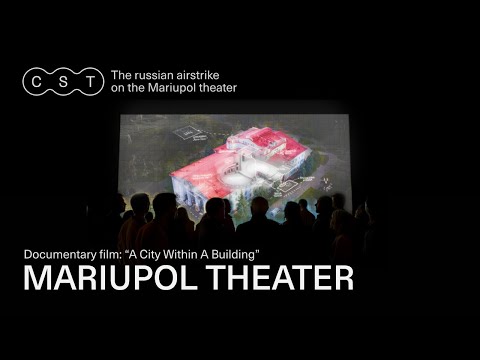A CITY WITHIN A BUILDING: The russian airstrike on the Mariupol theater Part 1

[scream] Mom, I'm here! [inaudible scream] [scream] Alla! — Where are you? — Where is the baby? — Let's go towards the car! On 16 March 2022, the Russian Air Force bombed Mariupol's Drama Theater... ... which at its peak served as a refuge for up to two thousand civilians. Hundreds are estimated to have been killed in this attack. This video was shot a few minutes after the explosion.
The survivors can be seen exiting the theater for the last time... On 28 March, the Russian forces captured the city center. To cover up their crimes, they quickly began falsifying evidence... ...and used the ruins of the theater as a backdrop for propaganda. At the end of 2022, Russians boxed in the theater with scaffolding... ... and bulldozed the bombed-out part of the building to the ground. We seek to explode this black box of denial by assembling...
... a growing archive of evidence on the theater’s wartime transformation. We analyzed thousands of photos, videos, and social media posts..., ...and located them within a 3D model of the theater. We conducted over a hundred hours of witness interviews... ... using a technique called situated testimony. Interacting with the virtual model of the theater, the witnesses... ... filled it with missing details and shared their experience of life in the theater. As a result of this process...,
... the model became an assemblage of collective memory. As we move through the theater, space by space..., ... we get to know the community of people who found refuge in it..., ... who took care of each other and made collective decisions. The archive we’ve assembled tells the story of a building that... ... — at the epicenter of a full-scale war — became an entire city. The Russian airstrike on the Mariupol theater Part 1. A city within a building It all started...
...with the shelling of the Azovskyi city district. The Azovskyi city district is on the other side of the city. From this direction and from this one! There were fierce battles in Manhush, and Mariupol turned out to be surrounded. That happened on 28 March. The city centre is in flames entirely. It is absolutely terrible here in Mariupol.
The whole city is up in smoke. Dima picked my mother and me up today. Out of the 23rd [district], we basically fled. Missiles flew over our heads; everything flew over our heads. And now, we are taking shelter in the Drama Theater, waiting for "a green corridor".
It was already clear even to me..., ...and it was obvious to everyone..., ...that staying in Mariupol was really... completely life-threatening. So, therefore, of course, many people wanted to evacuate from there. And everyone flocked to the Drama Theater. It was not just two of us, me and Lisa, on that day, March 5. An entire crowd rushed to the Drama Theater, Hundreds of thousands of civilians were trapped in the besieged city.
Despite having promised safe corridors, the Russians did not let them evacuate. But we are not discouraged. We will definitely win! The police announced that the evacuation was cancelled. All the people who couldn't get back home rushed to the Drama Theater.
The crowd was completely out of control. They flocked inside the Drama Theater and began to settle randomly. I didn't choose my place, in fact. When I got there, my friend has already taken this corner here. It was relatively safe there.
The third window on the left. We were staying around here. There was this niche here between these two columns. It only allowed to place, well, two sleeping pads there. This is where we were sitting between these two columns.
We got the kids ready immediately. Two kids. My elder son, Artem, who turned 7 years old... ... and my younger daughter, Nastia, who turned 3 years old. — Ok. And [where was] your place? — We put the curtain here. We had this office chair near the column.
— In what direction? — Like that, yeah. Then we took a detail from the scenery and arranged it in front of this column... ...because there was a cold draft from the exit. — Here? In-between a chair...? — Exactly. We had children lying here so we did it to block the draft.
And in front of us there were columns, and there were chairs. Well, not chairs, but, hm, theater seats. To lie down, you had to block the aisle. When someone tried to lie down... ... there was no space left to pass through. When I entered inside, I could not see the interior elements I used to take photos of. The aristocratic design and stuff.
It was all so full of people. It was so crowded you couldn't see the walls and the columns. You had to step over people to get somewhere. — And this is just the ground floor! — The ground floor? It's like that everywhere! And that was their only place, that's where they were staying. Here, everything was fully crowded to the aisle. Here, some people even slept on the aisle. Almost all over there!
It was literally impossible to walk there, you had to step over people. So many people were settling in the theater that they were staying... ... not only in the corridors but started taking shelter in the largest auditorium as well. Zhenia was mad at them and scolded them: "Please don't stay there. It's not safe!". I've been working at the theater for a long time. We did a number of various reconstructions.
That's why I knew the building well. I assisted the newcomers to accommodate. We were trying to make the sleeping place comfortable. We put some wooden decks. Then, took off the curtains and put them down to sleep on them.
Right away, people started looking for chairs and armchairs... ... to somehow sit down or lie down. They started tearing down the auditorium. All in all, the hall was torn down in a few days. The architecture of the building, designed for theatrical performances...
... had to be adapted to accommodate the needs of its growing population. The basement below the front entrance was initially designed to be a bomb shelter. Given that it was the safest area in the building, it reached capacity within days. The basement remained the most densely populated space in the theater...
... up until the moment of the air strike. Apart from the basement, the areas next to load-bearing walls... ... and away from the windows were also in high demand. The volunteers boarded up the windows to convert... ... the former staff offices into communal homes. Some of them were assigned to pregnant women. The auditorium was considered the most dangerous area to stay in..., ... partly because of the massive 3-ton chandelier. Still, even it had dozens of families living in it. Behind the metal curtain on the stage, there was a piano.
It drew crowds daily. The parquet hall above the theater entrance was transformed into a kindergarten. — They asked us to board up the windows here too. — You see, people with children live here as well...
— Hello! There were these giant Cyrillic letters saying "Children" on the both sides of the theater. They wrote "Children" near the staff entrance and the main entrance. The purpose was to guarantee that the Russians do not attack the theater. So that it was clearly visible from the plane... ... that there are people there hiding with children. For children to be safe as the concept of children should be always holy and protected. Although many people were against it because they thought that...
... the Russians would strike there deliberately knowing there are kids there. They wrote this text three or four days before the theater was bombed. The theater dwellers gathered in the back lobby..., ... around almost the only source of news: the radio. One of the actors' dressing rooms was converted into a makeshift hospital...
... where the only doctor residing in the theater provided first aid. Collective meetings took place in a number of theater rooms. Every day, volunteers passed by the stage area hundreds of times. In accordance to the people's needs, they organized missions to retrieve supplies. They brought groceries, blankets, and warm clothes from around the besieged city. These supplies were stored across multiple rooms at the same time. The theatre’s prop workshops became food preparation areas...
... where ingredients for soup and dough for bread were prepared. The cloakroom in the lobby was used to distribute food. Among all places of collective action, the field kitchen was probably the most important. The field kitchen was right by the drainage pipe. Water was gushing from that pipe. Yes, this is it. Place it next to the pipe. The red drainage pipe, the one descending from the roof. But turn it around.
Leave one meter from the field kitchen or rather one and a half meters... ... and fill this up with beefy 800-liter plastic barrels. Four or three... There were three of them! Place three barrels over there. Further, we blocked this off with wooden pallets. — Why? — Shell fragments. And so that we could not be seen. — The war was right here! In the early morning, the guys got up at 5 am.
The stove was already smoking. The stokers. Sasha and Ihor. They died in there. All of it, the entire floor collapsed here onto the pavement. I don't remember the exact date...
... but a water vehicle was put here. A queue of people had gathered. There were a lot of people! I shouted at them, "What are you doing?" "Now, God forbid, they spot us and strike". The aircraft flew overhead every day, bombarding constantly. — The city is ablaze from all directions. I said, "If you stay here, they will strike here, and we may all die".
I said, "They are deliberately targeting people. What are you doing?" — This is a plane flying around. They were basically bombarding all the time. Not even with the Grad launcher missiles... We heard the sound like that one from the movies. The air bombs!
We heard it striking. I can't describe that... And you have no idea what to do. Praying or whatever. You are completely lost when you hear that whistle. The plane sound feels like a panic attack. Because you know it is coming for a particular reason.
You know it can strike here or else fly further. There was this feeling... It was such a relief it flew past you. Nevertheless, you know it is going to kill someone else. It was a usual thing for us to discuss... ... the preferable ways of dying. We were all saying that we want it to happen fast. To die from a direct air strike...
... and not suffocating being poisoned by carbon monoxide, trapped under the ruins. And at the same moment, she asked me, "Still, we are going to get out of here, right?" On 15 March, about half of the people left the theater, trying to ecape from the city. At least a thousand civilians were staying in the building on March 16..., ... including all the witnesses. At 10:05 that day, a Russian jet bombed the theater...,
... wiping out this unique site of wartime solidarity. — It's getting closer. Let's run from here! — The plane! — Sasha! — I am scared. — Are you filming this? — Yes! — That's what "Russian World" looks like, fellows. — I wish every Russian city experienced hell like this.
— Fucking bastards! — You'll know what war is like and who are the fascists. — Jerks! — Oh my God, mummy, Anechka, MUMMY! — Mummy, Anechka... — Sounds like they are flying further. Getting quieter...
— Dear God, oh God, and Mummy, and Anechka, save me! — Mummy, Anechka, dear God, save me! — Mummy, dear God, Anechka, save me! *crying desperately*
2023-03-20 18:21


